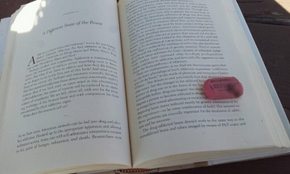
This isn’t a writing or grammar tip, but an observation. Have you ever noticed how we treat books so delicately, almost as though they were ancient artifacts? Eager to begin reading, we buy a new book, its pages crisp and fresh and enticingly unexamined by any other human eyes. An exciting new adventure is about to begin within.
Yet somehow, we cringe with reluctance when we break the spine. Finally, the deed is done and the reading begins, but still it’s as though we’re holding a treasure in our hands. Heaven forbid we should spill a few drops of coffee on the cover, or accidentally drop a blob of food between its revered pages. The blob is quickly wiped away, but an oily stain remains. Ouch!
Why do we venerate books so? Especially in this computer age, when, only a few years ago with the advent of e-books, some folks in the publishing business proclaimed that physical books would quickly be going the proverbial way of the dodo. Well, most of us now know they were wrong. There’s just something about holding a physical book in our hands while lying on the couch with a cup of tea and a snack that simply cannot compare with staring at a computer screen, no matter how convenient that may be.
This idea that books are overly esteemed occurred to me recently after I read a letter to the editor from an irate library user. The fellow was complaining about people who borrow library books and then proceed to mark them up—you know, pencil notes in the margins, highlighters, red-penned corrections, clever (or not) comments about the contents, and the like.
I beg to disagree. I love seeing marked-up books. It fascinates me to see what others have thought of the book; their opinions, their insights, perhaps their new ideas. To me, the more marked-up a book is, the more people have read it, and therefore the more popular it has been. It serves only to make me want to read it more.
As someone with a passion for proper spelling and grammar, I won’t hesitate to admit that a lot of this comes from my own obsession with correcting mistakes—I simply can’t let a typo (and there are typos in every published book) or error pass my eye without taking my editing pen to it. Recently I found a small copy-editing error in some sixth printing by Doubleday of Dan Brown’s The Da Vinci Code. Five seconds later, out flew the red pen, correction made. I just could not help myself. (By the way, there are other, much more substantive errors in The Da Vinci Code, but that’s a topic for another blog post.)
Now, I must emphasize here that I don’t condone the marking up of library books or other people’s books that are not your property. (If you do this, be sure to erase your markup!) But by all means, mark up your own books. It’s just paper, after all. Mark them up and pass them along. It’s democratic. Share your opinions with future readers. There are lots of us out there who’ll appreciate your comments. Just don’t let your kids read this post. And my apologies to any offended librarians out there.
2013 update: Times change. I love my Kindle and rarely buy print books anymore, except for my reference books. Kindle readers can be annotated, but I haven’t yet taken the time to learn how to do it.
